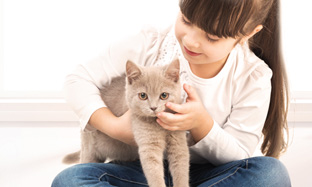
What nutritional needs for my senior cat?
Nowadays, thanks to significant advances in the medical and nutritional fields, a cat can easily live 16 to 20 years.
Around the age of 10, a senior cat starts only the last third of his life expectancy: he has reached the equivalent of 55 to 60 years for humans.
When getting older, the senior cat loses part of his olfactory and gustatory abilities. In order for him to retain the urge to eat, his food must be very appealing and retain its power of attraction. The animal protein richness and the ambient temperature coating for animal fats provide the food with a high palatability.
In addition, the food must be easily digestible to help the less efficient digestive system of an older cat to make the most of his diet.
In the elderly cat, molecules called free radicals have accumulated and are responsible for cellular aging. The intake of antioxidants through diet (such as vitamin E) helps to counteract the harmful effects of these free radicals.
Many elderly cats, even if they hide it well, suffer from osteoarthritis. Chondroprotectors can then help to support the joints. In order for your cat to maintain a good quality of life, have his health evaluated at least twice a year and adjust his diet to his needs, following your vet’s advice.

